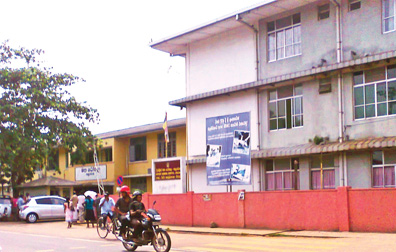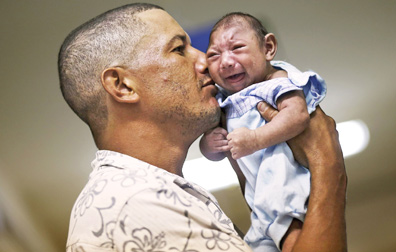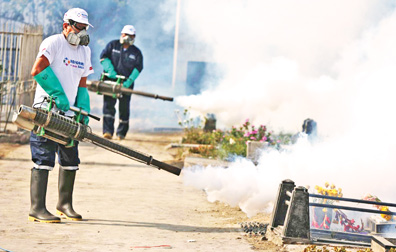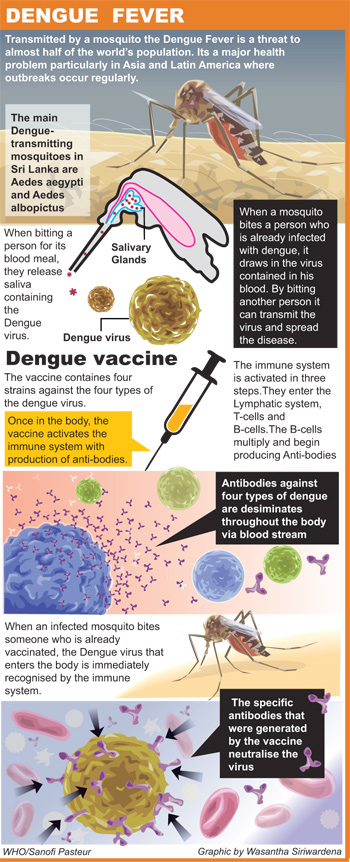|
H3N2 flu is the culprit - MRI
India returnee deaths, not from Zika – Chilaw Hospital
by Carol Aloysius
 As panic swirled and fears mounted of an imminent outbreak of the highly
contagious Zika disease in Sri Lanka, following the sudden deaths of two
patients admitted to the Chilaw Hospital after a pilgrimage to India, the
Hospital authorities now say, the actual cause was H3N2 flu and not Zika. As panic swirled and fears mounted of an imminent outbreak of the highly
contagious Zika disease in Sri Lanka, following the sudden deaths of two
patients admitted to the Chilaw Hospital after a pilgrimage to India, the
Hospital authorities now say, the actual cause was H3N2 flu and not Zika.
The victims, two women, Sujatha Malini (65) and G.C.Ranmenike (66), from the
village of Nallanrankotuwa in the Chillaw area had been admitted to the Chilaw
Hospital with high fever the same week following their return from a pilgrimage
to India . The deaths caused panic as rumours swirled that the cause was either
Zika or Chikungunya, an equally contagious disease. The latter disease currently
spreading in India, recently prompted health authorities in New Delhi to launch
several preventive measures to avert its spread among the millions of people
residing in this overcrowded city.
India’s concerns over the two diseases also led to a red alert for the two
diseases in Sri Lanka, with health officials informing medical authorities
manning all entry points to the country to be extra vigilant of travellers from
countries where both, Zika and Chickungunya were widely prevalent. The headlined
announcement of Lanka’s red alert for Chikungunya and Zika in a leading Sunday
newspaper, caused panic and confusion which was further compounded after an
alleged statement in the same news report by the Health Minister Dr Rajitha
Senaratne confirming, the country could be at risk of the two diseases, but,
adding that all state hospitals were geared to cope with such an emergency.
|

A Zika baby victim |
In an attempt to allay such fears and get to the bottom of the actual cause for
the sudden deaths , Chilaw Hospital officials took prompt action to send samples
from the two dead victims for testing at the Medical Research Institute at
Borella.
“The verdict we got from the MRI was, they had died of H3N2 flu and not Zika”,
the Hospital Superintendent , Dr Dinusha Fernando told the Sunday Observer,
Wednesday.
Endanger
Asked if he had any doubts regarding the verdict, he said, the MRI has very
advanced technology to typing the virus and testing everything down to minor
details with regard to the virus that caused their deaths. The extensive tests
have proved beyond doubt that they died from H3N2 flu.” Asked if it was a new
disease in Sri Lanka, he said , “ Influenza H3N2 is not new to Sri Lanka. Nor is
it dangerous”, he stressed.
So how come two persons died of it? we asked. “Although not usually considered a
dangerous disease, this influenza can endanger the lives of people having
underlined pathological diseases, such as, diabetes or cardiac problems, for
example. Both women who died were over sixty years.
If they had pre-existing chronic pathological diseases like diabetes, and had
neglected taking their prescribed tablets or not adhered to given diets, they
can quickly succumb to the disease once they have contracted the influenza,
since it affects the entire respiratory system”, he explained. Two other women
were also admitted from the same group of pilgrims, but they survived probably
because they had a strict control over their diet and any tablets they may have
taken”, he added.
|

Fumigation in progress |
So who else fall into the endangered category besides persons with compromised
immune systems? Pregnant women? Elderly?, we asked him.
“ While Zika does not harm a healthy pregnant woman, we are now advising women
who are pregnant or want to get pregnant to postpone any visit to a Zika
infected country since it could have adverse affects on the foetus if she gets
infected by the disease. Other vulnerable categories are infants less than one
year, up to children under five years. Elderly persons over 55 years are also
vulnerable due to weakened immune systems from advanced age,” he said.
Screening for Zika
Meanwhile, Epidemiology Unit Chief, Dr Paba Pallihawadana has also requested the
public not to panic, reiterating that all hospitals were ready to face any
emergency in the event of an outbreak of contagious diseases including,
Chikungunya and influenza .
Quarantine ( Human) Director, Dr Palitha Karunaprema confirmed that health desks
at the Bandaranaike International Airport ( BIA) which previously screened
passengers for Ebola and Mers, were now screening passengers arriving from Zika
prevalent countries.
 He said, passengers with suspected symptoms were sent to the Infectious Diseases
Hospital, Angoda which had all the hi-technology for testing any contagious
disease. He said, passengers with suspected symptoms were sent to the Infectious Diseases
Hospital, Angoda which had all the hi-technology for testing any contagious
disease.
He also confirmed that the Health Desks at the BIA were now fully operative on a
24 hour basis, but added that screening of travellers for Zika was at present
limited to ‘voluntary referral basis.’ Epidemiology Unit sources said, they were
seeking the help of travel operators to educate clients from Zika stricken
countries to be vigilant of any suspicious symptoms after they arrived here.
Chickungunya
Were there special desks to screen passengers for Chickungunya, especially now
that there was a red alert for the disease in Asia, including New Delhi our
closest neighbour?
The answer was NO. Dr. C. Salgado in overall charge of the health desks at the
BIA said, they would do if requested by the Epidemiology Unit or if recommended
by the World Health Organisation . The disease is endemic and since we have
already faced the challenge of an epidemic of this disease in the recent past,
we have the tools and knowledge to cope with any emergency”, he added.
Guidelines
Meanwhile, the Epidemiology Unity has also issued guidelines to all health
officers and Regional Health Directors, on how to look for symptoms and treat
patients with Zika.
Sources said, precautions against the entry of the disease to Sri Lanka had been
taken from the time it was first reported in 2015 when the disease was raging in
African and South American countries. They said, the disease was notifiable.
In a message to the public, the Epidemiology Unit said, Zika , flu and dengue
fever were mosquito borne diseases caused by the same Aedes Aegypti mosquito.
They can be treated at home and unless the fever is very high there is no need
to be hospitalised.
Our advice to anyone having flu like symptoms is to take a paracetamol according
to a doctor’s prescription, and rest.
If you have symptoms, avoid taking non steroidal anti inflammatory drugs (
NSAIDS) such as, ibuprofen, aspirin and dispirin. Sleep under nets and cover as
much of your body as possible to avoid being bitten by an infected mosquito
which can result in any of these diseases”.
Dengue vaccine
While dengue has tumbled to a new low in the country, confusion still persists
as to why the new vaccine, said to be effective for reducing the disease in
countries where it is being used, is still unavailable at the Lankan hospitals.
Contacted by the Sunday Observer, none of the health officials could explain
why. |

